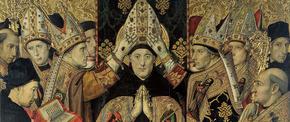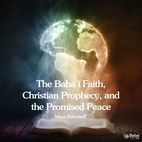The views expressed in our content reflect individual perspectives and do not represent the official views of the Baha'i Faith.
…the Essence of God is incomprehensible, so also are the worlds beyond this, and their condition. It is given to man to obtain knowledge, to attain to great spiritual perfection, to discover hidden truths and to manifest even the attributes of God; but still man cannot comprehend the Essence of God. Where the ever-widening circle of man’s knowledge meets the spiritual world a Manifestation of God is sent to mirror forth His splendour. – Abdu’l-Baha, Abdu’l-Baha in London, p. 66.
Do you consider yourself an iconoclast?
Generally, we use that term for people who challenge dogma, traditional beliefs or institutions when they think those widely-accepted ideas and concepts are wrong. But the word hasn’t always had that meaning.
Can you guess where the word came from? Yes, you’re probably guessing correctly—the root word is icon, which originally applied to religious icons, those physical representations of Divinity that some actually worshipped. An iconoclast originally meant someone who deliberately destroyed religious icons and images. [Iconoclast comes from the Greek eikōn, which means image; and the Greek verb klaein, which means to break.] At the opposite end of the spectrum, an iconodule means someone who worships idols, icons or graven images, or by extension someone who venerates traditional belief systems.
Looked at this way, the great iconoclasts were the founders and prophets of the world’s major Faiths—Abraham, Moses, Jesus, Muhammad and Baha’u’llah, for example—who all smashed idols, either literally or figuratively. They revolutionized the world of belief, changed the lives of millions of people and advanced the world’s spiritual knowledge, all by challenging accepted tradition and dogma and upending it for a new set of teachings. They broke our icons, and asked us to see past the material to the spiritual.
Do you think of yourself as an iconoclast or an iconodule? If you gravitate more toward the iconoclast point of view, you probably agree that it’s foolish to try to understand God in literal and fundamentalist ways, or to even think about a Creator in limited human terms.
That’s exactly how the Baha’i writings see it, too. Baha’is believe that human beings require an intermediary to begin to understand an ultimately unknowable God. Those intermediaries—the prophets and founders of the world’s great Faiths, those powerful messengers the Baha’i teachings describe as the ‘Manifestations of God’—bring us living evidence of God’s attributes. In their lives, their conduct, their love for all humanity, those manifestations give us a sense of the potential of our own souls, in that beautiful place where Abdu’l-Baha says “the ever-widening circle of man’s knowledge meets the spiritual world.”
This single paragraph from Baha’u’llah, the prophet and founder of the Baha’i Faith, summarizes the unique and logical way the Baha’is see this foundational truth:
The door of the knowledge of the Ancient Being hath ever been, and will continue forever to be, closed in the face of men. No man’s understanding shall ever gain access unto His holy court. As a token of His mercy, however, and as a proof of His loving-kindness, He hath manifested unto men the Day Stars of His divine guidance, the Symbols of His divine unity, and hath ordained the knowledge of these sanctified Beings to be identical with the knowledge of His own Self. Whoso recognizeth them hath recognized God. Whoso hearkeneth to their call, hath hearkened to the Voice of God, and whoso testifieth to the truth of their Revelation, hath testified to the truth of God Himself. Whoso turneth away from them, hath turned away from God, and whoso disbelieveth in them, hath disbelieved in God. Every one of them is the Way of God that connecteth this world with the realms above, and the Standard of His Truth unto every one in the kingdoms of earth and heaven. They are the Manifestations of God amidst men, the evidences of His Truth, and the signs of His glory. – Baha’u’llah, Gleanings from the Writings of Baha’u’llah, pp. 48-49.
This profound message, the same one that Christ delivered when he said, “He that hath seen Me hath seen the Father,” appears again and again throughout history. The manifestations of God demonstrate the radiant attributes of the Creator—love, peace, unity, kindness, knowledge, understanding and compassion. Whether named Buddha or Moses or Christ or Baha’u’llah, these messengers impart to the world the mysteries of God, living lives of enormous sacrifice to deliver their teachings.
Does this mean that God somehow becomes a human being and descends to earth? This idea, the concept of incarnation, says that God takes on a human form. Absolutely not, the Baha’i teachings say:
The sun does not leave his place in the heavens and descend into the mirror, for the actions of ascent and descent, coming and going, do not belong to the Infinite, they are the methods of finite beings. In the Manifestation of God, the perfectly polished mirror, appear the qualities of the Divine in a form that man is capable of comprehending. – Abdu’l-Baha, Paris Talks, p. 25.


















Comments
Sign in or create an account
Continue with Facebookor